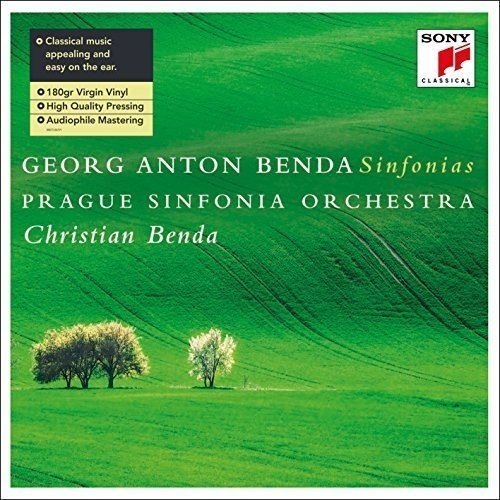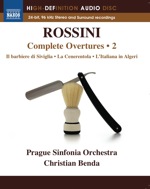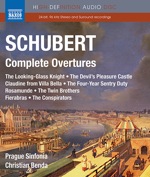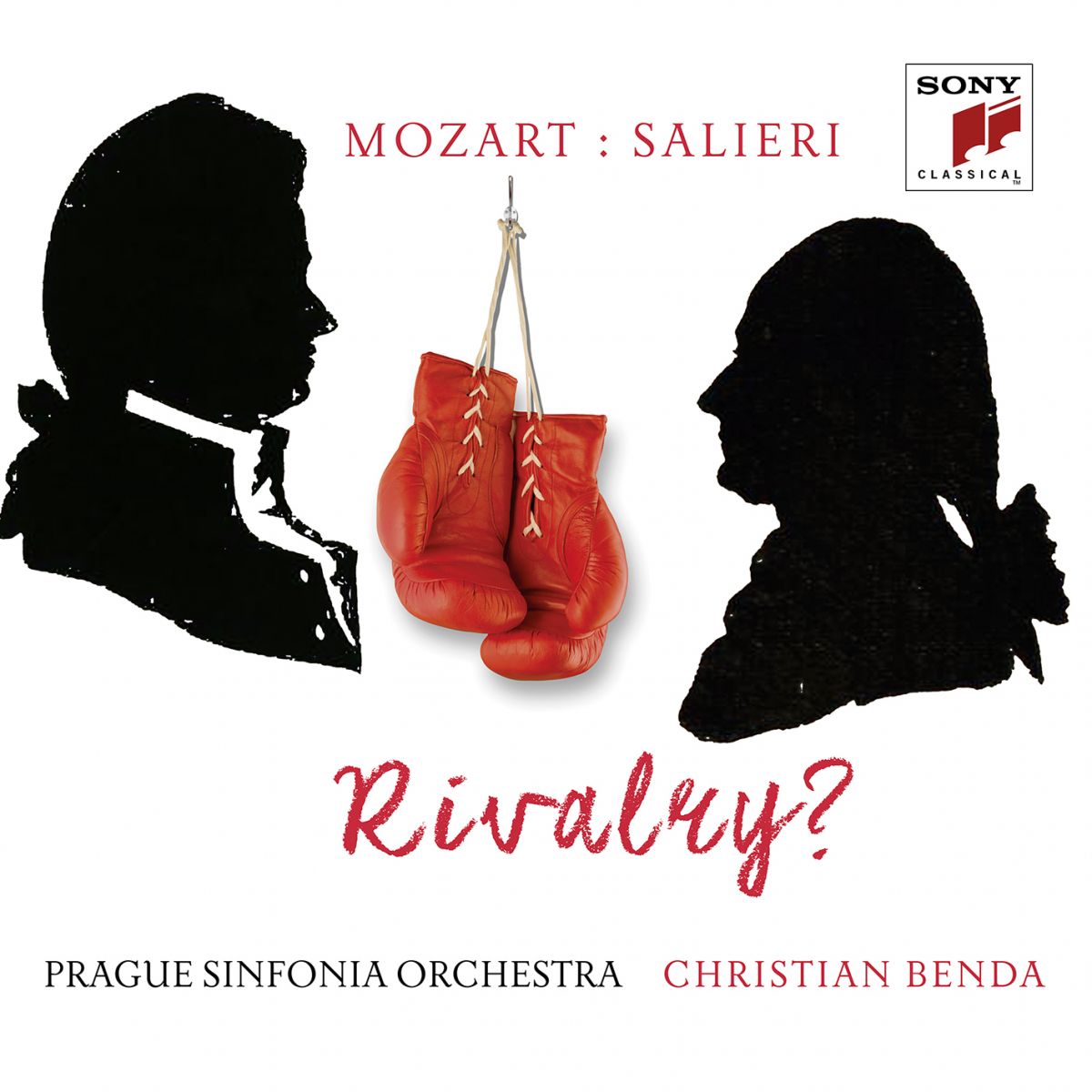SONY CLASSICAL - 2 CDs
Prague Sinfonia Orchestra/ Christian Benda
Release date: 05.04.2019
Labelcode 0190759195925
MOZART – SALIERI
The names Mozart and Salieri immediately bring to mind the romantic fiction which has dwelt on hearts and minds since Mozart's untimely death in 1791. Mozart was a free spirit, surrounded by a narrow-minded and spiritually-limited courtiers’ world; Mozart, the rebel against imperial authority, who was poisoned by a murderer as yet unrevealed; Mozart, whose body was tossed into an anonymous pauper’s grave, to cover up the traces of the crime. Salieri, on the other hand, who embodied every- thing the hot-headed Mozart detested, was the archetypical courtier, kowtowing to his superiors, dishing it out to his subordinates, scheming and envious, a mediocre composer so jealous of Mozart’s genius that he eventually poisoned him.
Although some of this may possibly be true, overall it is romantic fiction, which arose when old Salieri, delirious on his deathbed, accused himself of having murdered Mozart. This rumour circulated in Vienna: it can be found in Beethoven's Conversation Notebooks, where the latest “news” on the topic is mentioned. Salieri himself denied this statement. Tearfully he explained to his student, Ignaz Moscheles, “Mozart, – you know, I am supposed to have poisoned him. But no, it’s malice, nothing but malice. Tell the world, dear Moscheles, old Salieri, who is about to die, told you so himself.”
Recent research suggests other suspects – the Freemasons, for example.Mozart had shamelessly pressed his lodge brothers for loans, possibly seduced one or the other's wife during piano lessons, and, last but not least, made their secret rituals public in his Magic Flute. However, no valid evidence has yet been found.
The myth of Mozart’s poisoning by Salieri survives so persistently thanks also to many prominent advocates, including Alexander Pushkin. In his 1832 play Mozart and Salieri can be found all the motives still flourishing today: craftsmanship versus genius – Mozart, the unworthy vessel of divine inspira- tion, to whom everything comes without effort; and Salieri, who achieves nothing despite his hard work, and turns murderer out of “artistic envy”. The same constellation appears in Peter Shaffer’s 1979 play Amadeus, whose 1984 movie version by Milos Forman became one of the greatest film successes of the 1980s, winning eight Oscars.
The play and the film revived the myth of the poisoning, which had proved to be unfailingly effective. Possibly not quite so in the minds of the authors: as Pushkin's romantic concept is expressed to such a degree that one might suspect a hidden intent of parody or satire.
So what truth is there to this story? There must have been occasional jealousies between the established court music director Salieri and the newcomer Mozart, who as a freelance artist stirred up the Viennese scene. However, evidence of high mutual esteem is well documented: Salieri arranged numerous Mozart performances; he conducted the premiere of the Great G minor Symphony him- self. And Mozart reports enthusiastically in his last letter to his wife Constanze on 14th October 1791: “He listened and looked with all his attention, and from the overture to the last choir there was not a piece that didn’t elicit a ‘Bravo!’ or ‘Bello!’ out of him.” After Mozart’s death, his son became Salieri’s pupil.
The clearest evidence of a balanced relationship between Mozart and Salieri is a joint composi- tion: the cantata Per la ricuperata salute di Ofelia. In 1785, the Viennese music publisher Artaria announced its publication and mentioned a third composer: Cornetti; the name was in italics, in all likelihood a pseudonym. To this day, his identity remains unresolved. Various names have been put forward – even Emperor Joseph II in person. However, a lot speaks for the singer and composer Stephen Storace: his sister Nancy, one of the prima donnas of the time, to whom the work was ad- dressed, was equally esteemed by Mozart and Salieri, and had shortly before recovered from illness. The title of the piece refers to this: in the role of Ofelia in Salieri's opera La Grotta di Trofonio, Nancy Storace enjoyed triumphant successes after her recovery.
No copy of the 1785 print has been preserved – it is not even certain that the cantata was ever published; it was considered lost. In 2015, the composition reappeared in the Prague National Library collections, discovered by Timo Jouko Herrmann. However, this version differs from Artaria’s pre- viously announced cantata with piano accompaniment – an arrangement usual at the time for home performances. In fact, the Prague version contains only the soprano voice and a bass line typical of the orchestral scores of the period, so it could very well be some kind of “score shorthand”. For this first CD recording, the conductor Christian Benda has reconstructed the missing orchestral parts.
The occasional dissent between Mozart and Salieri was probably based on different stylistic schools: Mozart, born in Salzburg, was influenced by Italy, and in fact, in 1770, when he was fourteen, he received his first major opera commission from Milan; Salieri, on the other hand, was a French classicist, and was considered the heir to Gluck's reform of opera, causing a stir in this genre, even in Paris. Mozart is undoubtedly the more modern: through his existence as a freelance artist, and hence in his music, through the subjective appropriation of forms and means of expression. While Salieri had his successful career in the imperial capital Vienna, Mozart celebrated his greatest triumphs in Prague. The kingdom of Bohemia was ruled in personal union by the Emperor in Vienna, Prague was therefore not under the pressure of the mechanics of social and political control of an imperial capital. There was a spirit of opposition, more open to aesthetic innovation, and also stirrings of political unrest, with the constant desire for freedom and independence always alive. Nonetheless, the country had to wait until 1918 to become independent.
In 1938, the German and subsequently the Soviet occupation marked the end of independence; in 1968, the “Prague Spring” was immediately repressed; in 1989, after more years of oppression, came the “Velvet Revolution” and the fall of Communism. The leader of the Civil Rights Movement, playwright Václav Havel, a school-friend of Milos Forman, moved to Prague Castle as democratically elected president. Mozart's music accompanied this turning point in history: at Havel’s inauguration in 1990, the proclamation of general amnesty was celebrated with a performance of the Coronation Mass. A group of Prague musicians gathered in the hall of the main railway station after Havel’s death to perform Mozart’s Requiem in his honour. There is no doubt that Mozart's music still falls easily on ears in Prague to this day.
Ingo Dorfmüller, 2019 - translation: Deborah M. Lockwood & Ian Menzies
 GEORG ANTON BENDA: Sinfonias - PRAGUE SINFONIA ORCHESTRA - CHRISTIAN BENDA
GEORG ANTON BENDA: Sinfonias - PRAGUE SINFONIA ORCHESTRA - CHRISTIAN BENDA
Sony Classical presents Georg Benda and his Sinfonias
Vinyl LP
_______________________________________________________________________
GEORG ANTON BENDA
We are in Prussia during the 18th century, and more precisely in Potsdam, at Sanssouci Castle. The three brothers Franz, Georg Anton and Johann Benda, born in Alt-Benátky near Prague, work here as musicians and composers at the court of Frederick the Great. Georg is very impressed by the enlightened and tol- erant atmosphere of the court, where Voltaire is a regular visitor. He becomes a Protestant and a Freemason. Even though the king is a musician, he has no taste for musical innovation. Georg cannot develop his skills as a composer at Sanssouci and he is only second violin in Frederick the Great’s orchestra. He therefore moves in 1750 to the court of Saxe-Gotha, where he can express his innovative talent as Hofkapellmeister.
As a child, he studied rhetoric and “expressive declamation” at school, which now helps him be- come the best representative of the “melodramatic form” recently created by Jean-Jacques Rousseau. Gotha’s court orchestra (Hofkapelle) commissions church, court and theatre music, but no opera. Nonetheless, Xindo Riconosciuto, Benda’s only Italian opera, is premiered at the court in 1765. But finding no stimulation for the composition of dramatic music, he requests a six-month study trip to Italy. He is already 43 years old when he visits Venice, Bologna, Florence, and Rome. Five years after his return from Italy, he is appointed Kapelldirektor in Gotha.
In 1774, Europe’s most famous theatre company, founded in 1769 by Abel Seyler, a Swiss banker, actor and philanthropist, settles at the court of Gotha. The company’s repertoire includes German plays, Sing- spiele and Rousseau’s melodrama Pygmalion (a piece that also inspired Benda). Seyler establishes Gotha’s first Masonic lodge; Georg and the Duke of Saxe-Gotha-Altenburg are among its members. He also com- missions Benda to compose several melodramas, including Medea and Ariadne auf Naxos. The latter receives rave reviews in Germany and throughout Europe, highlighting the originality, sweetness and ingenious skill of the work. Further compositions of the Gotha period follow: Benda’s Singspiele Romeo und Julie, Walder and Der Holzhauer. Benda leaves his post in 1778, apparently after a dispute with the composer Anton Schweitzer, Kapellmeister of the Seyler troupe and the Gotha Theatre.
Seeking employment in vain, he travels to Hamburg, Mannheim, Berlin and Vienna. Wolfgang Amadeus Mozart, after a performance of Medea in Mannheim, writes on November 12, 1778 to his father: “I saw such a piece twice here with the greatest pleasure! – Really – nothing ever surprised me more! What I saw was “Medea” by Benda; he also composed another one, “Ariadne auf Naxos”, both thorough- ly excellent; you know that among the Lutheran Kapellmeisters Benda always was my favourite; I like these two works so much that I carry them about with me.” In another letter he adds: “My passion for this kind of work is immense”. Benda inspired the 24-year-old Mozart for his opera Zaide (1780) and, as late as 1791, the Introitus of Mozart’s Requiem, written shortly before his death, is strongly reminiscent of the Trauergesang “Im Grabe wohnt Vergessenheit” from the third act of Romeo und Julie composed by Benda 15 years earlier (1776). In Vienna, Benda composes his last melodramas Theone and Pygmalion, and returns to Gotha where he receives a pension for life.
He then withdraws from social events and lives far from all cities, working primarily at the preparation of an edition of his earlier musical works. In 1781, he travels again to Paris, where he puts on a performance of Ariadne auf Naxos, and in 1792 he definitively ends his career as a composer with his cantata Bendas Klagen. During his last years his interest is focused on the political ideas of the French Revolution and he devotes himself to philosophy.
All of Georg Benda’s five children become musicians, singers or actors. The following anecdote illustrates nicely his character and his nature: his wife has just passed away and he goes to the piano to express his grief through soulful modulations. On being asked whether to send out the notices of his wife’s death, Benda, thoroughly absorbed in his music and charmed by his inventions, goes into her room to discuss it with her. Only at the sight of her lifeless body does he realize again what happened.
Georg Benda dies in Köstritz in Thuringia at the age of 73.
_______________________________________________________________________
Classical Source - Antony Hodgson - December 2016 (5 out of 5)
Later generations of the Benda family inherited much musical talent including conductor (and composer) Christian whose performances are given on this recording in convincing style. Benda exploits the horns high in their register. The Prague Sinfonia has a fine horn section and these musicians perform their demanding melodic passages with immaculate accuracy. In the C-major Symphony that ends the programme the conductor’s firmly rhythmic treatment of the Minuet-like Finale gives suitable weight to this work. The Benda Symphonies are superbly played and are given excellent recorded sound within a spacious acoustic.
_______________________________________________________________________
Gramophone - Balazs Zay - August 26, 2016
Christian Benda conducts cleverly, lively, colorfully. These are no doubt very good pieces. A valuable niche publication.
____________________________________________________________________
Classical Ear - Evan Dickerson - June 7, 2016
Much wit and colourful invention… Each Sinfonia’s performance is keenly accented and serves the music well, with faster movements being the main draw. There is an obvious affection in Christian Benda’s conducting… The recording is bright… favouring the Prague Sinfonia Orchestra’s upper strings… A likeable venture.
____________________________________________________________________
Full sunshine (4 out of 4) - Musikzen - L'air du jour - Marc Vignal
Family history - Benda (Georg Anton) vigorous thanks to Benda (Christian)
Maybe this CD (only six symphonies) will be followed by another one. It is to be wished, because the interpretation is of the highest caliber, both vigorous and precise, under the direction of Christian Benda.
____________________________________________________________________
klassik erleben - Helmut Peters
Listening to Christian Benda's fantastic recording of six symphonies by his ancestor with the Prague Sinfonia Orchestra, one is convinced that the musical language of the Bohemian composer must just be in the conductor's blood.
____________________________________________________________________
De Volkskrant - Biella Luttmer - April 20, 2016
Prague Sinfonia Orchestra makes early classical pieces almost swinging
They blow you full in the face the sinfonias of Georg Anton Benda (1722-1795): fresh and spring-like, with strings that cannot wait to play their hectic rhythms.
The young Mozart wrote all this to his father: "I have heard here twice with the greatest pleasure Medea by Benda. Never before was I so taken. (...) You know that among the Lutheran Kapellmeister Benda was always my favorite. I love these works so much that I carry them with me. "
The instrumental pieces by the composer from the region that is now part of the Czech Republic, played by a czech symphony orchestra, led in a strikingly brilliant way by one of Benda's descendants: Christian Benda.
He has a good eye for the different characters in the works and keeps everything rhythmically so well in hand that the early classical pieces are almost swinging.
____________________________________________________________________
Pizzicato - Guy Engels - April 26, 2016
Refreshing Benda symphonies
Christian Benda shapes the six short symphonies in an equally refreshing, relish, virtuosic and captivating way. The conductor makes his orchestra shine, gives the musical text charm and provides it with delicate bright tones. The music never stops, pulsates constantly, and thanks to a detailed reading remains always exciting.
____________________________________________________________________
Radio-Canada - Frédéric Lambert - April 29, 2016
"It is precise, it is admirable and it is conducted by his direct descendant after three centuries," says Frédéric Lambert about Georg Anton Benda: Sinfonias, an album dedicated to the symphonic works of the Czech composer of the 18th century, who particularly influenced Mozart. It is indeed the violinist Christian Benda, from the same family as the composer, who conducts the Prague Sinfonia Orchestra on this opus. Frédéric Lambert calls this album a brilliant madness and explains to Catherine Perrin why he recommends it to anyone wishing to discover lesser-known composers.
____________________________________________________________________
Classique News - Lucas Irom - May 1, 2016
Nice idea of playing his symphonies...
Even on modern instruments, orchestra and conductor know how to emphasize weightlessly the expressive palette of a hypersensitive Benda. The panache, the regular pulse - despite a too distant and echoing sound, the fineness of conducting, the excellent sense of contrasts, the expressive vitality, which obviously refers to Gluck and even seems to anticipate Joseph Haydn, gives here justice to a first symphonic corpus confirming the eloquence and maturity of a composer active in the 1760s and 1770s, pioneer figure of the language of the European Enlightenment.
____________________________________________________________________
IBS - Italy
Maestro Christian Benda conducts the music of one of his ancestors with the Prague Sinfonia Orchestra
In this recording he gives us a lively interpretation of some symphonic works by Georg Anton, well known and respected by Wolfgang Amadeus Mozart. Let us hear with satisfaction six rare symphonies in three movements in an excellent rendition also by the Prague Sinfonia Orchestra.

.jpg)
ROSSINI - COMPLETE OVERTURES
PRAGUE SINFONIA ORCHESTRA - CHRISTIAN BENDA
BLU-RAY HIGH DEFINITION AUDIO DISC
Vol. 2 - Vol. 1
_________________________________________________________________________________________
Michael Tumelty - Herald Scotland
The brilliant Naxos series of complete Rossini Overtures is increasingly acclaimed and seems now unstoppable in its march towards being not only the finest collection of Rossini overtures available, but actually indispensible to those who love this exhilarating music. Purists, intellectual elitists and snobs sometimes deride Rossini as the composer who couldn't write counterpoint (or was too lazy to do so) and who had about two good musical ideas (crescendo and accumulation) out of which he made a career. I find Rossini's Overtures a life force in their vivacity and breathtaking sense of elan, wonderfully captured and projected on this latest volume by Christian Benda and his crisp, articulate Prague Sinfonia Orchestra. More favourites are here, including The Italian Girl In Algiers, Cinderella and Tancredi, with some lesser known items and a fascinating student work, Grand'Overtura, where you can hear the seed elements of Rossini's later music at work. Absolutely sparkling.
________________________________________________________________________________________
Rated 10/10 - Christophe Huss - Classics Today France
...Getting rid of the Karajan style “wall of strings”, we discover colors and counterpoint in this music full of accents. Without bragging nor brutality, Benda plays this rustic and refreshing game. In an overall just a little tangy sound, in order not to evoke any purring comfort, Benda gives a nice boost to the overtures and their discography. We do not have here a CD featuring a “best of”program since this is volume 1 of a future complete set, but everything (see the transition to the coda in Otello) is approached with the same seriousness in articulation and clarity. At the end of the course, if it continues at this level, Benda will be better and steal a march on his only rival, Neville Marriner on Philips. Thus another success for Naxos.
________________________________________________________________________________________
David Hurwitz - Classics Today UK
Up to now, the standard collection of Rossini overtures has been Neville Marriner’s correct but somewhat flat-footed series on Philips. This new project promises to improve on that set considerably. Christian Benda’s Prague Sinfonia has all of the discipline of Marriner’s ensemble, but with an extra sprightliness and vivacity—bright piccolo and wind sonorities plus crisp percussion—that the earlier set doesn’t match. There’s more sheer fun in the music making on this new release, a quality that’s fully in evidence and properly exploited, even in Rossini’s most serious music… I look forward eagerly to the rest of this cycle. It sounds like it may well become the series of choice.
________________________________________________________________________________________
Michael Tumelty - Herald Scottland
This is effervescent music that, in the right hands, retains its full sparkle and splendour. And here is a cracking, taut and exhilarating new set from the terrifically lean and energetic Prague Sinfonia, directed with full Rossinian dynamism and momentum by Christian Benda.
________________________________________________________________________________________
Jerry Dubins - Fanfare
...Benda and the Prague Sinfonia Orchestra’s performances are an absolute delight, featuring playing that’s bright as a button and droll as those Rossini caricatures one commonly sees plastered on program posters and album covers. This first volume affords both a strong start and a strong promise for the most comprehensive and important survey of Rossini’s overtures since Marriner’s 1970s effort.That’s a definite recommendation.
________________________________________________________________________________________
John Sheppard - Music Web International
The Prague Sinfonia Orchestra and Christian Benda have already recorded the complete Overtures of Schubert for Naxos on two well filled and utterly delightful discs… It was an obvious step to move next to the complete Overtures of Rossini which so obviously inspired Schubert. I am happy to say that this disc has many of the same very successful features of its predecessors. From Toscanini to Giulini or Gui, and from Marriner to Norrington there is a very wide range of recoreded performances available and Benda stands up well in this very distinguished company. There is real theatrical vitality in each of these performances, as well as grace and wit in phrasing... This is an admirable start to what looks like being a very desirable series.
________________________________________________________________________________________
 Schubert wrote his first theatrical work when he was fourteen and his hopes of success in the genre, never truly realised, were long lasting. He wrote concert overtures and music for Singspiele (Song-plays), in some of which he was guided by his teacher, Salieri. The music for the melodrama Die Zauberharfe (The Magic Harp) is better known as the Overture to Rosamunde, but evidence of his captivating vitality, tunefulness and theatricality is everywhere to be heard.
Schubert wrote his first theatrical work when he was fourteen and his hopes of success in the genre, never truly realised, were long lasting. He wrote concert overtures and music for Singspiele (Song-plays), in some of which he was guided by his teacher, Salieri. The music for the melodrama Die Zauberharfe (The Magic Harp) is better known as the Overture to Rosamunde, but evidence of his captivating vitality, tunefulness and theatricality is everywhere to be heard.
Of volume 1 of the CD release (8.570328) the American Record Guide wrote:
‘The Prague players relish these sun-lit and tuneful pieces and respond with great enthusiasm and affection.’
Sound format: PCM Stereo / DTS-HD Master Audio 5.1
Note: This Blu-ray Audio Disc is only playable on Blu-ray Disc players and not compatible with standard CD or DVD players.


